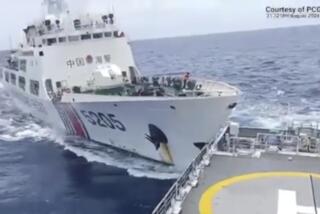Protesters Land on Disputed Islands in East China Sea
TAIPEI, Taiwan — After a bit of derring-do with the Japanese coast guard, activists briefly planted Taiwanese and Chinese flags on a disputed island group Monday in the East China Sea.
The six people who landed were part of the largest protest flotilla to sail to the uninhabited islands, known as Diaoyu in Chinese and Senkaku in Japanese.
Located 110 miles northeast of Taiwan and about 200 miles from Japan’s Okinawa islands, the disputed chain lies amid rich fishing grounds. The ocean floor around the group may hold oil and natural gas deposits.
Calling Monday’s mission a success, Kin Chieh-shou, a Taipei lawmaker, said protesters were more determined than ever to assert Taiwan’s claim to the islands, despite Japanese warnings against more protests.
A flotilla of 31 fishing boats--carrying 140 protesters from Taiwan, Hong Kong, and Macao--left two northern Taiwanese ports Sunday evening.
Japanese coast guard vessels began tailing the boats at the 12-nautical-mile territorial limit around the islands, sending up flares and sounding sirens.
Activists and reporters aboard the 30-ton Hungtah were blocked twice by a Japanese patrol boat, which demanded it leave the area immediately.
Racing past the Japanese coast guard at dawn, Kin and Hong Kong activist Chen Yu-nan jumped from their boat onto a rocky outcropping on the main island and raised Chinese and Taiwanese flags.
Minutes later, four other activists swam ashore from another boat and planted two Taiwanese flags on another outcropping.
The flags blew into the water or were removed by the Japanese coast guard shortly afterward.
No violence was reported, but five of the fishing boats were damaged in collisions with the Japanese.
Japan administered the islands between 1895 and the end of World War II and got them back from the United States in 1972. Taiwan and China, citing Ching Dynasty references to the islands dating from 1699, say the land belongs to them.
More to Read
Sign up for Essential California
The most important California stories and recommendations in your inbox every morning.
You may occasionally receive promotional content from the Los Angeles Times.










